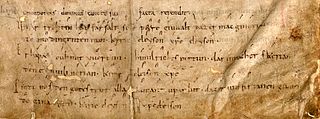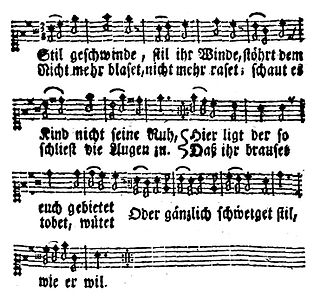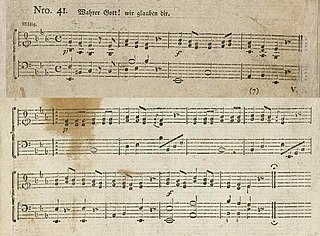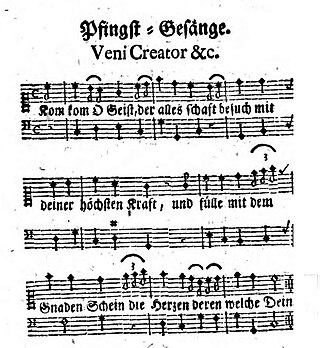
"Lauda Sion" is a sequence prescribed for the Roman Catholic Mass for the feast of Corpus Christi. It was written by St. Thomas Aquinas around 1264, at the request of Pope Urban IV for the new Mass of this feast, along with Pange lingua, Sacris solemniis, and Verbum supernum prodiens, which are used in the Divine Office.
"Jesus Christus, unser Heiland, der von uns den Gotteszorn wandt" is a Lutheran hymn in ten stanzas by Martin Luther for communion, first published in 1524 in the Erfurt Enchiridion. It is one of Luther's hymns which he wrote to strengthen his concepts of reformation. The models for the text and the melody of Luther's hymn existed in early 15th-century Bohemia. The text of the earlier hymn, "Jesus Christus nostra salus", goes back to the late 14th century. That hymn was embedded in a Hussite tradition.

"Gott sei gelobet und gebenedeiet" is a Lutheran hymn of 1524 with words written by Martin Luther who used an older first stanza and melody. It is a song of thanks after communion. Luther's version in three stanzas was printed in the Erfurt Enchiridion of 1524 and in Johann Walter's choral hymnal Eyn geystlich Gesangk Buchleyn the same year. Today, the song appears in German hymnals, including both the Protestant Evangelisches Gesangbuch, and in a different version in the Catholic Gotteslob.

The Leise or Leis is a genre of vernacular medieval church song. They appear to have originated in the German-speaking regions, but are also found in Scandinavia, and are a precursor of Protestant church music.
"Den Herren will ich loben" is a Christian hymn by Maria Luise Thurmair, based on the Magnificat and set to a 1613 melody by Melchior Teschner, which was used for "Valet will ich dir geben". The hymn in three stanzas of eight lines was first written in 1954, and revised in 1971. It appeared in the Catholic hymnal Gotteslob in 1975, and in the current Gotteslob, but also in a German Protestant hymnal. A general song of praise, it has been set to music several times.

"Erde, singe" is a German Catholic hymn with a text by Johannes Cardinal of Geissel, Archbishop of Cologne, written in 1837 as a Christmas carol in ten stanzas. The current Catholic hymnal Gotteslob has only four stanzas as GL 411, which are in the general section of praise.

"Das Grab ist leer, der Held erwacht" is a Catholic hymn for Easter, first printed in 1777 in the hymnal Landshuter Gesangbuch published by Franz Seraph von Kohlbrenner. Keeping only the first of five stanzas, with additional two stanzas, it appeared in hymnals of the 19th century, and later in different versions in several regional sections of the Catholic hymnal Gotteslob. It is a frequently sung hymn in Easter services.

""Wahrer Gott, wir glauben dir" is a Catholic hymn. Christoph Bernhard Verspoell (1743–1818), a cleric from Münster, wrote text and melody, and published it in 1810 in his hymnal Orgelbegleitung zu den Gesängen beym Römisch-kathol. Gottesdienste. Herausgegeben von C. B. Verspoell. The song in two stanzas has remained in the repertory of church hymns, used mainly during Eastertide, but also for communion and funerals. It appears in several regional sections of the Catholic hymnal Gotteslob, as GL 770 in Cologne, as GL 780 in Limburg and Münster, and as GL 783 in Speyer, among others.

"Im Frieden dein, o Herre mein" is a three-stanza German Christian communion hymn. In 1527 the early Reformer Johann Englisch wrote two stanzas as a rhyming close paraphase of the Nunc dimittis, or Canticle of Simeon. The hymn is sung to a melody by Wolfgang Dachstein, written before 1530. Friedrich Spitta revised the lyrics in 1898 and added a third stanza. His revision transformed Englisch's prayer of an individual with a focus on a peaceful death to a communal one more about peaceful life in unity.
"Christus ist erstanden! O tönt" is a Catholic hymn for Easter. It was written as a paraphrase of the Easter sequence Victimae paschali laudes, and appeared in 1816 by Johann Weinzierl. A melody was composed by Paul Schniebel in 1826. The first of six stanzas begins: Christus ist erstanden! O tönt, ihr Jubellieder, tönt!. The hymn is similar to Schubert's Deutsche Messe in its idea to provide singable hymns in German for the congregational.
"Nun lässest du, o Herr" is a Christian hymn by Georg Thurmair written in 1966 as a paraphrase of the Nunc dimittis canticle. It was part of the German Catholic hymnal Gotteslob of 1975 as GL 660 with a 16th-century melody by Loys Bourgeois. With this melody, it is also part of the Protestant hymnal Evangelisches Gesangbuch as EG 695. It is part of the second edition of the Gotteslob as GL 500, with a new 1994 melody.

"Komm, Schöpfer Geist, kehr bei uns ein" is a Christian hymn in German for Pentecost. The text is a paraphrase of the Latin hymn Veni Creator Spiritus by Heinrich Bone. The melody is an adaptation of the Latin hymn's plainchant. It was first published in 1845. In the Catholic hymnal Gotteslob, it is GL 351.

Heinrich Bone was a German educator and hymnwriter. He wrote a reader for German studies which was used for higher education in Germany, Belgium, Luxembourg and Austria, until it was banned during the Kulturkampf. He published a hymnal, Cantate!, which was used by several Catholic dioceses and became a model for common hymnals. Some of his own hymns, including paraphrases of Latin hymns, are part of recent hymnals, both Catholic and Protestant, such as "Komm, Schöpfer Geist, kehr bei uns ein" as a paraphrase of the 9th-century hymn for Pentecost, Veni Creator Spiritus.
"Komm, Heilger Geist, der Leben schafft" is a Christian hymn in German for Pentecost. The text is a paraphrase of the Latin hymn Veni Creator Spiritus by Friedrich Dörr, with a 1524 melody. It was first published in the Catholic German hymnal Gotteslob in 1975.

Cantate! (Sing!) is a German Catholic hymnal first published in 1847, and continued in seven editions until 1879. It was a collection of 444 old and new songs, edited by the educator and hymnwriter Heinrich Bone, and the first Catholic hymnal in German that was used in multiple dioceses. Several of the songs are still part of the common Catholic hymnal in German, Gotteslob.
"Lass uns in deinem Namen, Herr" is a Christian hymn in German, with text and music written in 1964 by Kurt Rommel. The first lines read "Lass uns in deinem Namen, Herr, die nötigen Schritte tun". It appears in major modern Protestant and Catholic hymnals in German.
"Alle Menschen höret auf dies neue Lied" is a Christian offertory hymn with German text, translated in 1972 by Sigisbert Kraft from a 1966 Dutch hymn by Simon Jelsma with a melody by Wim ter Burg. It appeared from 1975 in German hymnals and song books.
"Manchmal feiern wir mitten im Tag" is a Christian hymn written in 1974 with German text by Alois Albrecht and a melody by Peter Janssens. The song, of the genre Neues Geistliches Lied (NGL), is part of German hymnals, including Gotteslob, and songbooks including ecumenical collections and books for young people. It begins: "Manchmal feiern wir mitten im Tag ein Fest der Auferstehung".
"Öffnet eure Tore" is a Christian hymn in German, written by Christoph Bernhard Verspoell for the Feast of the Ascension. The text is based on Psalm 24. While the text was written in Münster in 1810, the melody was composed for a Trier hymnal of 1846. It became part of the regional sections of the German Catholic hymnal Gotteslob.

"Kommt her, ihr Kreaturen all" is a Catholic hymn with words in German by Johann Georg Seidenbusch, first published in Regensburg in 1687, using a local melody of 1657. It has appeared in regional sections of the German hymnal Gotteslob. The hymn was translated into English as "Come all ye creatures of the Lord". It is commonly used as a hymn sung during processions on the Feast of Corpus Christi.











